Trip to Berlin
Reise nach Berlin
by N. Richard Wagner
Copyright © 2006 by N. Richard Wagner, all rights reserved.
The Theater and the Opera
We went out once to see a play at Bertolt Brecht's theater and once to a Mozart opera.
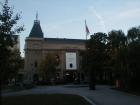 |
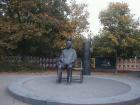 |
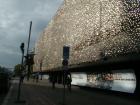 |
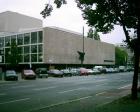 | |||
| Brecht's Theater | Bertolt Brecht | Deutsche Oper | ||||
|---|---|---|---|---|---|---|
Bertolt Brecht and his theater in Berlin
I first heard of Bertolt Brecht in 1959 when I saw a performance of his play The Caucasian Chalk Circle (Der kaukasische Kreidekreis, 1944) as an undergraduate at the University of Kansas (Lawrence). My friends and I thought the play was fantastic. Many of us were taking German at the time, and the German instructors talked about Brecht and his importance as a playwright and poet. They also discussed a review in the local student paper that complained about the "noisy and squeaky" set changes, not realizing that this was a deliberate part of Brecht's approach to drama: the Verfremdungseffekt (translated as "distancing," or "estrangement," or "alienation" effect), which aims to educate the audience, to keep them aware that they are watching a play. A "didactic" approach. Brecht's ideology could be described as "leftist," or "socialist," or "idealized communist."
Many think that Brecht (1898-1956) was the most important German writer of the twentieth century -- that he deserved but did did not get the Nobel Prize for Literature. Others would elevate Thomas Mann (who did receive the Nobel Prize) above Brecht. Indeed Mann was one of those difficult "literary" writers, while Brecht has enjoyed great popularity -- recently there were three separate Brecht pieces being professionally performed in New York City at the same time. But both these writers are giants of German literature, Brecht the dramatist and poet, Mann the novelist, so comparisons are not helpful.
The picture at the left below shows a large sculpture that was part of the 2006 world soccer championship in Berlin, focusing on prominent German writers. The list is perhaps controversial, but Brecht is there (a small volume), right above Goethe (who is usually considered the greatest writer in German).
Most Americans know a little about Brecht even if they don't realize it: his popular song "Mack the Knife" (Mackie Messer) comes from Brecht's striking opera The Threepenny Opera (Die Dreigroschenoper, 1928, music by Kurt Weill). In fact, because the song was popular both in America and in Europe, on some lists this was the single most popular song in the twentieth century.
During my 1963 visit to Berlin, I wanted to see what a "communist" country was like, so I went over to East Berlin practically every evening. In fact, after a few times, the East German border guard was wishing me Einen schönen guten Abend (a very good evening) as I went through the crossing. You needed a visa to visit East Germany, but any tourist could visit East Berlin. (Well, not a West German tourist.)
My favorite destination in 1963 was Brecht's famous theater group, the Berliner Ensemble, in the building Theater am Schiffbauerdamm. Brecht had died in 1956, but they still regularly performed Brecht plays, as they do to this day. I saw three or four Brecht plays at that time. During my most recent trip, nothing by Brecht was on the program, so John and I went to a performance entitled Wir Negativen (we negative ones). This is a comedy performance made up of selections from text, poems, and songs by the German satirical, leftist comic Kurt Tucholsky, who was popular in Germany in the 1920's. It was a great production, but we missed a fair number of the references.
Officially, the East German government was anti-American, but in fact most people in East Berlin were friendly toward Americans.
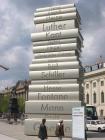 |
 |
 |
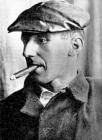 | ||||
| Walk of Ideas | Brecht's Theater | Brecht Statue | Brecht (1930) | ||||
|---|---|---|---|---|---|---|---|
The Opera in Germany
When I sailed (yes, sailed, on the the German ship Bremen) to Germany in 1962, I had never seen a real opera. I was a provincial kid from Kansas who'd never lived in a big city either. So Hamburg, where I lived, had an opera house with performances every night, while Berlin had three opera houses. I had never much liked musicals -- for me they are just plays in which the characters inappropriately sing their lines. I didn't realize that actual "grand opera" would make a different impression on me. My breakthrough opera was one by my namesake, Richard Wagner: Die Meistersinger von Nürnberg (The Mastersingers of Nuremberg). This was a four-and-a-half hour performance, followed by almost half an hour of applause. I was just carried away by the music.